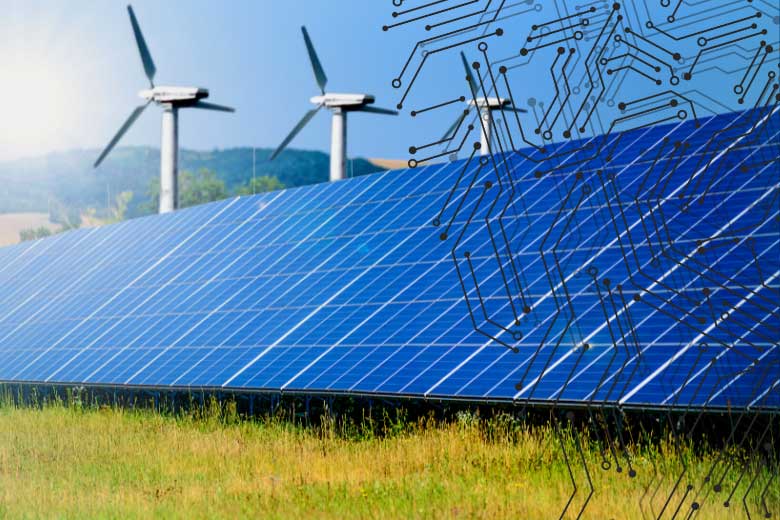Artificial Intelligence In The Renewable Energy Market: Revolutionising The Future
4PEL Staff
May 2023

The world is moving towards a sustainable future, and Renewable Energy is at the forefront of this transition. The potential for Artificial Intelligence in improving renewable energy operations is immense, and it is crucial for industry leaders, researchers, and policymakers to collaborate and invest in this transformative technology.
AI has demonstrated success in learning from and analysing enormous amounts of data. The global market for AI in Renewable Energy is expected to reach US$75.82 bn by 2030, with a compound annual growth rate (CAGR) of 27.9% over the forecast period.
What is Artificial Intelligence?
Researchers have inherently focused on imitating the ways humans think and process things. AI, or artificial intelligence, is a field of computer science that focuses on the development of intelligent machines capable of performing tasks that typically require human intelligence. Applications of AI can be used across various industries including healthcare, finance, and transportation.
In the renewables segment – AI has numerous applications like scheduling and forecasting, monitoring energy generation, predicting weather, robotic cleaning etc. Let us delve a little deeper into a few broad areas where AI is boosting the clean energy transition:
Energy prediction and forecasting
According to a report by the International Renewable Energy Agency (IRENA), AI-powered energy forecasting can improve the accuracy of renewable energy generation predictions by up to 10%. AI algorithms can analyze historical data, weather patterns, and other relevant factors to predict renewable energy generation from sources such as solar and wind. Accurate predictions enable better grid integration, efficient energy management, and optimal utilization of renewable resources to ensure a more stable energy supply.
Smart grid optimization
AI can optimize the operation of smart grids by analyzing real-time data from various sources, including energy production, consumption, weather conditions, and grid infrastructure. It can balance energy supply and demand, manage energy storage systems, and minimize grid congestion – thereby improving the overall efficiency and reliability of the grid.
For instance, AI can optimise energy production by adjusting the output of wind turbines based on weather conditions. This can lower costs and increase the system's general effectiveness.
Energy management and optimization
It is evident that renewable energy is the fastest-growing source of electricity generation, accounting for over 30% of energy capacity additions worldwide. The wealth of data generated by renewable energy systems presents an opportunity for data-driven decision making.
AI algorithms can optimize energy consumption patterns in buildings, homes, and industrial facilities. They can analyze data from sensors, smart meters, and other devices to develop intelligent energy management systems that minimize energy waste, optimize energy usage, and reduce costs.
Renewable resource assessment
AI techniques can be used to assess and identify optimal locations for renewable energy installations. By analyzing geographical data, satellite imagery, and weather patterns – AI can identify areas with high solar or wind potential, helping in the planning and development of renewable energy projects.
Intelligent Asset Management
AI algorithms can monitor the performance of renewable energy systems in real-time and detect anomalies or faults. By analyzing sensor data and system parameters, AI can identify potential issues, predict maintenance requirements, and optimize maintenance schedules, reducing downtime and maximizing system performance. With the help of AI, operators can plan maintenance activities proactively, enhance repairs, and ultimately enhance the efficiency of renewable energy systems. For example, AI has been used in real-time monitoring of structural integrity of wind turbines and the temperature of solar panels to identify potential problems before they cause damage or failure.
Energy storage optimization
Energy storage is crucial in the renewable energy ecosystem as it addresses the intermittent nature of sources such as solar and wind. AI can enhance energy storage systems by analyzing historical data, real-time energy generation, and demand patterns. This enables more precise predictions of energy storage needs, enhancing the overall efficiency and reliability of renewable energy supply.
How is Fourth Partner Energy using AI?
It is evident that AI has brought about a comprehensive transformation in the renewable energy market. At 4PEL, our in-house team of experts handle everything from a site survey to design, project execution to post-sales asset management. AI-powered tools are used at every stage of the process especially in assisting design, operations and maintenance.
Our promise to the client is maximized generation and our AI-backed RMS (remote monitoring system) supports the Asset Management team by remotely identifying issues and assisting in ticket creation, tracking, and management.
With AI advancements, features like calculating on-site losses, accurate generation prediction, localized weather forecasts, and precise soiling loss calculations should become standard. 4PEL's RMS ensures flexibility and data accuracy, thereby delivering on the maximized generation guarantee at the client's site. This standout feature sets us apart as India's top solar energy company.
Kickstart your company’s Sustainability journey with India’s sharpest minds, backed by innovative technology and applications – 4PEL will be happy to partner with you to facilitate energy transition, visit www.fourthpartner.co and chat real-time with our RE agents.